Disgrace Blu-ray Movie
HomeDisgrace Blu-ray Movie 
Image Entertainment | 2008 | 119 min | Rated R | Apr 27, 2010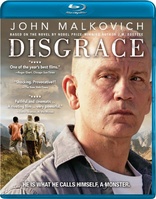
Movie rating
6.6 | / 10 |
Blu-ray rating
| Users | 0.0 | |
| Reviewer | 3.5 | |
| Overall | 3.5 |
Overview
Disgrace (2008)
After an imprudent affair with a student, Cape Town professor David Lurie (John Malkovich) flees to his daughter's remote farm to escape the scandal, only to find tragedy when a trio of black youths brutally assaults them. But Lurie is forced to face apartheid's lasting repercussions when he discovers that one of the attackers is related to a trusted employee (Eriq Ebouaney) in this pensive drama based on J.M. Coetzee's novel.
Starring: Paula Arundell, Antoinette Engel, John Malkovich, Eriq Ebouaney, Jessica HainesDirector: Steve Jacobs
| Drama | 100% |
Specifications
Video
Video codec: MPEG-4 AVC
Video resolution: 1080p
Aspect ratio: 2.35:1
Original aspect ratio: 2.39:1
Audio
English: DTS-HD Master Audio 5.1
Subtitles
English SDH, Spanish
Discs
25GB Blu-ray Disc
Single disc (1 BD)
Playback
Region A (B, C untested)
Review
Rating summary
| Movie | 3.5 | |
| Video | 4.0 | |
| Audio | 3.5 | |
| Extras | 2.0 | |
| Overall | 3.5 |
Disgrace Blu-ray Movie Review
"He doesn't act on principles, he acts on impulse."
Reviewed by Casey Broadwater April 30, 2010John Malkovich has made a career out of playing bizarre, sometimes borderline mentally unhinged alpha males, from seedy Vicomte Sébastien de Valmont in Dangerous Liaisons and psychotic assassin Mitch Leary in In the Line of Fire, to Con Air’s Cyrus “The Virus” Grissom and, of course, a surreal version of himself in Being John Malkovich. Like Christopher Walken, another actor often called upon when a role requires “quirk,” Malkovich has become known for his odd mannerisms, his facial tics, and a distinctively enunciated voice that one reporter for The Guardian memorably described as “a reedy, faintly orgasmic drawl.” He plays self- possessed, aloof, and affected almost uncannily well, and he’s got a dead-eyed stare that alternately calls to mind deadly intellect and the lurking, predatory nature of a great white shark. All of these traits are required for his latest film, Disgrace, an unsettling drama that’s faithfully based on the award-winning novel by South African author J.M. Coetzee.
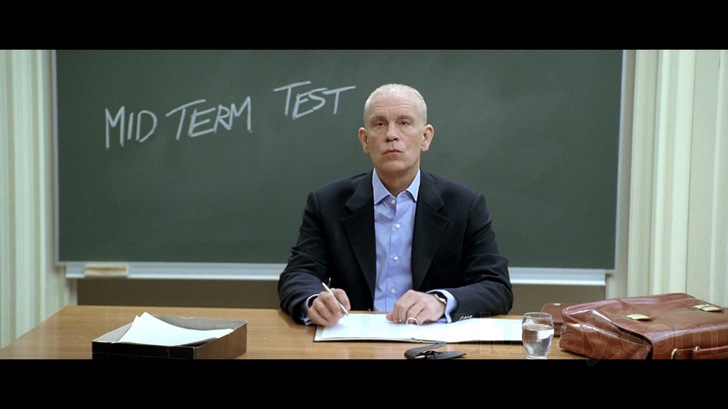
Come to teacher...
Malkovich plays David Lurie, a lonely and pompous middle-aged professor of Romantic Poetry who tries doggedly to outdo his hero, Lord Byron, in the sheer wantonness of his sexual proclivities. He’s got a thing for young women of color—set in modern, post-apartheid South Africa, race is an indelible part of the story—and when the opportunity presents itself, he sets about seducing one of his students, using lines like, “A woman’s beauty does not belong to her alone…it is her duty to share it.” It’s dubitable whether their sex is consensual—there’s a disturbing scene where he has his way with her seemingly lifeless body—and Lurie lands before a reprobation committee, where he admits guilt but shows zero remorse. (“I’ve become a servant of Eros,” he says, mockingly, to which my wife, who was watching the film with me, replied, “Forget Disgrace, this movie should be called The Biggest ---hole in South Africa.”) David is fired from his post and heads to the countryside to stay with his lesbian daughter Lucy (Jessica Haines), who sells flowers and shares her plot of land with Petrus (Eriq Ebouaney), a kindly but—in David’s view—opaquely-intentioned black farmer. Racial tensions are pulled taut when three black youths rape Lucy, kill all of the dogs in her kennel, and then, for kicks, set David on fire with methyl spirits. The drama unfolds in the way that the three characters react to the event; David—himself a rapist—wants retribution, Lucy seeks reconciliation, and Petrus, used to the region’s violence, responds with it’s alright now, at least you’re alive-type sentiments.
On the most basic level, Disgrace is a character study, slicing open David’s unrepentant exterior to reveal a self-loathing heart. “Sooner murder an infant in the cradle than nurse un- acted desires,” he says, quoting William Blake and defiantly defending his actions. On a walk with Lucy, however, he tells a different story, about a neighbor’s golden retriever that grew withdrawn after being repeatedly beaten for growing excited at the smell of a bitch in heat. “What was ignoble about the spectacle,” he says, “was that the poor dog had begun to hate its own nature. It no longer needed to be beaten. It punished itself.” Clearly, David is also referring to his own situation. And it doesn’t take much critical digging to reveal the film’s subtext, an allegorical rendering of race relations in South Africa, with sexual power serving as a metaphor for white privilege and control. The central irony of the film is that the figurative raping of a land and people group by the Afrikaners has resulted in a climate of fear where whites literally barricade themselves behind massive walls and iron gates to distance themselves against a backlash of extremely real physical and sexual violence. Where David is very much of the old guard, seemingly unaware that his inherent power as a white man is dwindling, Lucy is so forward thinking and reconciliatory about race that she blindly endangers herself. After the rape, she refuses to press charges, involve the police, or leave her farm. She thinks she’s being progressive by charging on as if nothing had happened, but she’s really just laboring under the cultural baggage of white guilt.
The pointed social symbolism occasionally imposes itself somewhat awkwardly on the actions of the characters—I was basically screaming at Lucy to do something—but Disgrace has its share of narrative subtlety too. One subplot has David working for a local pro-bono veterinarian, helping to euthanize animals. When he starts, we get the sense that he might even enjoy the process, but his attitudes shift slowly throughout the film, and while he doesn’t exactly redeem himself in our eyes, he certainly becomes a more compelling and relatable character as we near the third act. Malkovich himself gives an unsurprisingly charismatic performance, somehow turning an intrinsically unlikable character into a magnetic onscreen presence, and Jessica Haines and Eriq Ebouaney have no trouble keeping up. Really, perfect casting all around. Director Steve Jacobs, working off a screen adaptation by his wife Anna Maria Monticelli, keeps a tight rein, throwing in a few embellishments but generally keeping the film’s visual style restrained, letting the drama do most of the talking. The pacing is a little languorous around the middle, but the plotting stays engagingly unpredictable throughout. The film could’ve easily played out in typical Hollywood fashion, as a bleary-eyed redemption story that ends in hand-holding unity, but Disgrace has no easy answers—in this collective fall from grace, everyone has wronged and everyone has been wronged.
Disgrace Blu-ray Movie, Video Quality 
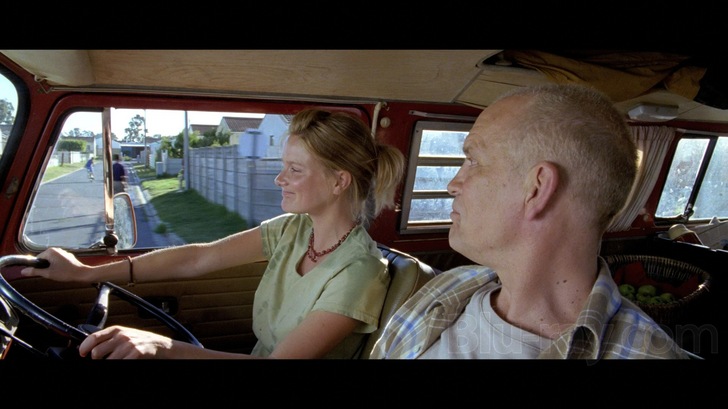
Image Entertainment brings Disgrace from South Africa to Blu-ray with a 1080p/AVC- encoded transfer—framed in a 2.35:1 aspect ratio—that looks quite good. DP Steve Arnold impressively glasses the African countryside and on-location interiors, and his 35mm camerawork is preserved in a thin layer of grain that adds warmth and texture to the polished, naturally filmic image. Clarity is consistently strong, with close-ups that show fine detail in props and clothing, like the knobby texture of Jessica Haines' terrycloth bathrobe, and display every craggy nuance of John Malkovich's face. The film's use of color is often restrained, but it is well saturated and natural, moving from a frequently bluish cast during the opening scenes in Cape Town to a more vibrant dusty palette out on Lucy's farm. Black levels are solid, and the film's tight contrast provides a picture with decent depth, although you will notice some slight black crush in darker scenes, and occasionally overblown highlights during bright outdoor sequences. Nothing distracting, however, in the least. The same goes for technical quality of the encode. The film is nestled comfortably on a 25 GB disc, and I didn't spot any overly apparent compression issues outside of the infrequent and expected increase in noise during nighttime scenes. Overall, this is a solid, if never completely outstanding transfer.
Disgrace Blu-ray Movie, Audio Quality 
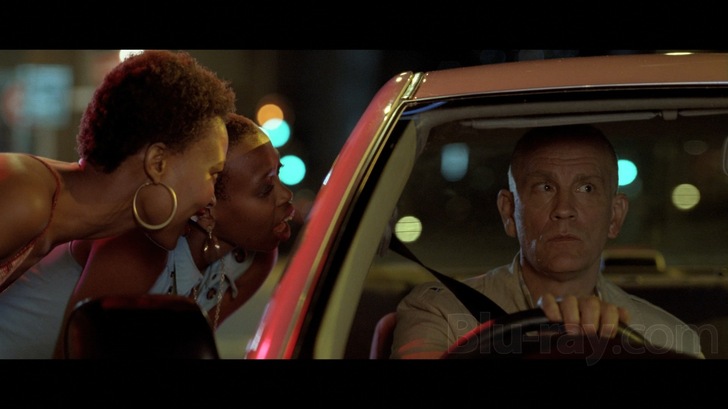
Likewise, we have the film's DTS-HD Master Audio 5.1 surround track, which perfectly but unremarkably serves the film's rather undemanding audio needs. As you'd expect, this is a quiet, dialogue-driven drama, and vocals are prioritized, sitting high and nicely balanced in the mix. Composer Anthony Partos contributes a scarce score, and there's the occasional burst of classical/operatic music—all of it sounding bold and expansive—but most of the film is played out in near silence, with only environmental ambience as a backdrop to the characters' conversations. The surround speakers are quietly but effectively engaged throughout, giving us chatter in the university halls, rainy day patter, the buzz of insects, and even a few cross-channel effects, like the roar of a motorcycle panning through the rears. This is an understated audio experience, for sure, but it suits the film fine. I didn't notice any hisses, drop-outs, buzzes, or other slip-ups. Optional English SDH and Spanish subtitles appear in easy-to-read white lettering at the bottom of the frame.
Disgrace Blu-ray Movie, Special Features and Extras 
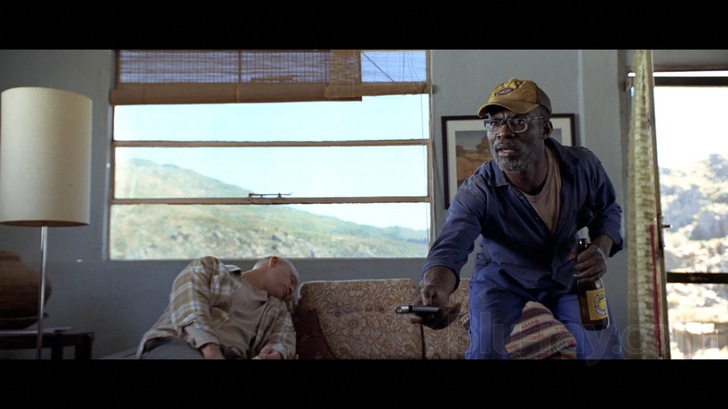
Interviews (SD)
Here, all of the key players answer the usual questions—how did you get involved, did you do any
research, what is your character like, what was it like working with John Malkovich, etc. Includes
interviews with writer Anna-Maria Monticelli (6:42), producer Emile Sherman (3:39), director Steve
Jacobs (8:11), John Malkovich (2:53), Jessica Haines (3:40), Antoinette Engel (3:35), Eriq
Ebouaney (3:33), and DP Steve Arnold (2:55). A "play-all" button is noticeably missing.
Disgrace: Behind the Scenes (SD, 9:48)
Your usual assortment of behind-the-scenes footage, covering pre-production, location scouting,
casting sessions, wardrobe fittings, and the atmosphere on set.
Trailer (SD, 2:13)
Disgrace Blu-ray Movie, Overall Score and Recommendation 
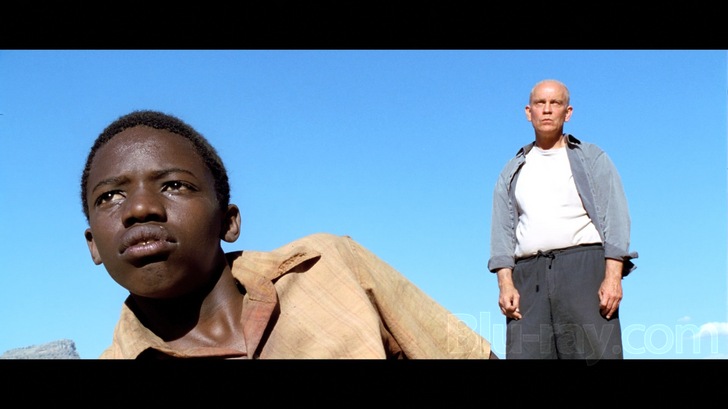
Brutal and uncompromising, Disgrace is not an easy film to watch, but it does touch on some ultra-touchy issues regarding race in South Africa. Though the pointedness of the allegory occasionally alters the actions of the characters—resulting in some stubborn and ultimately unbelievable decisions—I'd say Disgrace is certainly worth a rental for anyone in the mood for a serious-minded drama.
Similar titles
Similar titles you might also like

Generation Kill
2008

Tobruk
1967

Fort Apache, The Bronx
1981

Men of Honor
2000

The Water Diviner
2014

The Aftermath
2019

The Young Lions
Limited Edition to 3000 - SOLD OUT
1958

Raid on Rommel
1971

Dark of the Sun
The Mercenaries
1968

Stalingrad
1993

Emperor
2012

High Road to China
1983

Hart's War
2002

Devotion
2022

Five Minutes of Heaven
2009

The Ottoman Lieutenant
2017

Zorba the Greek
1964

'71
2014

Ice Cold in Alex
1958

The Big Red One
Theatrical Cut & Reconstructed Version in SD
1980